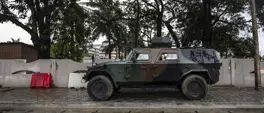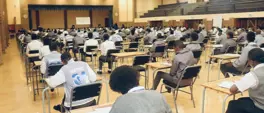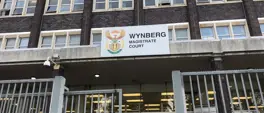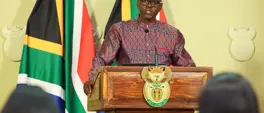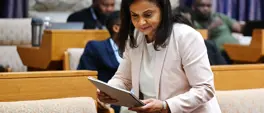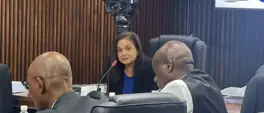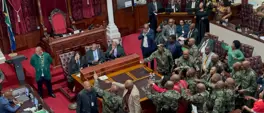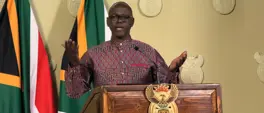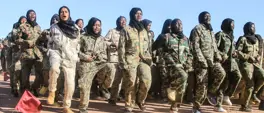Israelis go on strike for Gaza deal after hostage deaths
AFP
2 September 2024 | 10:50Relatives and demonstrators have accused Prime Minister Benjamin Netanyahu's government of not doing enough to bring the hostages back alive.
JERUSALEM - Strike action brought parts of Israel to a halt on Monday in a bid to raise pressure on the government to secure the release of the remaining hostages in Gaza, after the military recovered the bodies of six captives that the health ministry said had been "murdered" by Hamas.
Relatives and demonstrators have accused Prime Minister Benjamin Netanyahu's government of not doing enough to bring the hostages back alive, and during mass rallies on Sunday called for a truce deal to help free dozens who remain captive.
The military said on Sunday the bodies of six hostages, who were all captured alive during Hamas's 7 October attack on southern Israel that triggered the war, had been recovered from a tunnel in the southern Gaza Strip, prompting outpourings of grief and fury.
The Israeli health ministry said post-mortem examinations showed the six had been "murdered... with several close-range gunshots" shortly before they were found by troops.
The Histadrut trade union called a nationwide strike beginning at 6:00 am (0300 GMT) "for the return" of the remaining 97 hostages, including 33 the military says are dead.
Several major cities across Israel joined the strike, closing schools and municipal services for several hours. Ben Gurion international airport near Tel Aviv was operating "as usual", a spokesperson told AFP, but takeoffs were halted for two hours.
READ: Deadly Israeli raids in West Bank as Gaza war rages
In Jerusalem and some other cities, life appeared to go on as usual. Some private companies, like public transportation providers, have partially suspended operations in support of the strike.
The strike followed a day of mass protests on Sunday that saw tens of thousands on the streets of Tel Aviv and elsewhere, part of a series of anti-government rallies during the war. On Monday, protesters again blocked roads in Tel Aviv.
Histadrut chief Arnon Bar-David said he wanted to "stop the abandonment of the hostages", adding that "only our intervention can shake those who need to be shaken", an apparent reference to top Israeli decision-makers who have opposed a truce or stalled in months of negotiations.
Out of 251 hostages seized during the 7 October attack, only eight have been rescued alive by Israeli forces but scores were released during a one-week truce in November - the only one so far.
Mediation efforts led by the United States, Qatar and Egypt since then have repeatedly stalled.
US President Joe Biden is due to convene a meeting with his negotiating team later on Monday to "discuss efforts to drive towards a deal that secures the release of the remaining hostages" following "the murder" in captivity of the six including US-Israeli Hersh Goldberg-Polin, the White House said.
Israel named the five others as Carmel Gat, Eden Yerushalmi, Almog Sarusi, Ori Danino and Russian-Israeli Alexander Lobanov.
On Sunday, Biden said he was "still optimistic" a deal could be reached.
'STOP EVERYTHING'
Yair Keshet, uncle of hostage Yarden Bibas, said during Sunday's protest in Tel Aviv that the government needed to "stop everything and to make a deal", which campaigners say is the best option to ensure the return of the remaining captives.
On the ground in the Hamas-run Gaza Strip, civil defence rescuers said an Israeli strike on Sunday killed 11 people at a school where Israel's military said a Hamas command centre was based.
The fighting continued on Monday, coinciding with the second day of localised "humanitarian pauses" to facilitate a vaccination drive after the first confirmed polio case in 25 years.
An AFP correspondent reported some air strikes overnight, and the civil defence agency said artillery shelling and gunfire rocked Gaza City, where two people were killed when a missile hit a residential block.
Louise Wateridge, spokeswoman for the UN agency for Palestinian refugees, UNRWA, said 87,000 children received a first dose of the polio vaccine on Sunday in central Gaza.
UNRWA chief Philippe Lazzarini called the inoculation campaign a "race against time to reach just over 600,000 children" in the war-torn territory of 2.4 million people.
"For this to work, parties to the conflict must respect the temporary area pauses," he said.
The Israeli military campaign against Hamas has so far killed at least 40,738 people in Gaza, according to the territory's health ministry. The UN rights office says most of the dead are women and children.
The October 7 attack that triggered it resulted in the deaths of 1,205 people, mostly civilians and including hostages killed in captivity, according to an AFP tally based on Israeli official figures.
WEST BANK RAIDS
The war has sent regional tensions soaring, with violence surging in the occupied West Bank, which is separated from Gaza by Israeli territory.
At least 24 Palestinians have been killed since Israel launched simultaneous raids on Wednesday across the northern West Bank. Militant groups have claimed 14 of the dead as members.
A shooting Sunday in the southern West Bank killed three Israeli police officers, authorities have said. The military said the suspected assailant was "eliminated" following a manhunt.
READ: Macron says war in Gaza 'must stop'
Middle Eastern and Western governments as well as UN officials have called on Israel to end the large-scale operations in the Palestinian territory, which it has occupied since 1967.
In the city of Jenin, the streets were largely deserted and most shops were closed on Monday, after loud explosions and clashes were heard during the night.
Israeli bulldozers in the Jenin city centre and other areas have caused damage to infrastructure including water systems, officials have said.
"No one dares to go out," said Jenin resident Adel Marai Egbaria.
Get the whole picture 💡
Take a look at the topic timeline for all related articles.

